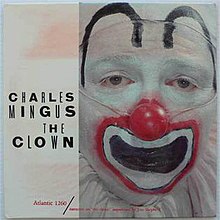The Clown is a studio album by the jazz bassist and composer Charles Mingus. It was released in September 1957 through Atlantic Records.[1][2] The recording took place on February 13 and March 12, 1957. The title track features the improvised narration of Jean Shepherd.
| The Clown | ||||
|---|---|---|---|---|
 | ||||
| Studio album by | ||||
| Released | September 1957[1][2] | |||
| Recorded | February 13 and March 12, 1957 | |||
| Studio | Atlantic (New York City) | |||
| Genre | Jazz | |||
| Length | 40:41 | |||
| Label | Atlantic SD-1260 | |||
| Producer | Nesuhi Ertegün | |||
| Charles Mingus chronology | ||||
| ||||
| Review scores | |
|---|---|
| Source | Rating |
| AllMusic | |
| The Penguin Guide to Jazz Recordings | |
| The Rolling Stone Album Guide | |
According to Nat Hentoff's liner notes, Mingus explained why he chose those four tracks for the album: "I selected these four over two others that were more intricate because some of those guys had been saying that I didn't swing. So I made some that did. This album also has the first blues I've made on record."
Notes about the tracks
editThe following excerpts come from the original liner notes and are statements made by Mingus himself.
On "Haitian Fight Song", Mingus said "I'd say this song has a contemporary folk feeling. My solo in it is a deeply concentrated one. I can't play it right unless I'm thinking about prejudice and hate and persecution, and how unfair it is. There's sadness and cries in it, but also determination. And it usually ends with my feeling: 'I told them! I hope somebody heard me.’ ".[6][7]
"Blue Cee" is a standard blues in two keys, C and B♭, "but that's not noticeable and it ends up in C, basically", he said and continued "I heard some Basie in it and also some church-like feeling".
"Reincarnation of a Lovebird" is a composition dedicated to bebop saxophonist Charlie Parker, known commonly as "Bird". "I wouldn't say I set out to write a piece on Bird. [...] Suddenly I realize it was Bird. [...] In one way, the work isn't like him. It's built on long lines and most of his pieces were short lines. But it's my feeling about Bird. I felt like crying when I wrote it."
"The Clown" tells the story of a clown "who tried to please people like most jazz musicians do, but whom nobody liked until he was dead. My version of the story ended with his blowing his brains out with the people laughing and finally being pleased because they thought it was part of the act. I liked the way Jean changed the ending; leaves it more up to the listener." According to a later biography, Mingus was a fan of Shepherd's radio show on WOR and outlined a concept for Shepherd but encouraged him to elaborate and improvise.[8]
A deluxe edition of The Clown was issued in 2000 on Rhino featuring two bonus tracks.
Track listing
editAll tracks written by Charles Mingus.
- "Haitian Fight Song" - 12:01
- "Blue Cee" - 7:48
- "Reincarnation of a Lovebird" - 8:31
- "The Clown" - 12:29
Deluxe Edition bonus tracks
edit- "Passions of a Woman Loved" - 9:52
- "Tonight at Noon" - 5:57
Personnel
edit- Charles Mingus - bass
- Shafi Hadi - alto and tenor saxophone
- Jimmy Knepper - trombone
- Wade Legge - piano
- Dannie Richmond - drums
- Jean Shepherd - narration (track 4)
References
edit- ^ a b "September Album Releases" (PDF). The Cash Box. The Cash Box Publishing Co. Inc., NY. 21 Sep 1957. Retrieved 21 June 2019.
- ^ a b "The Clown". The Billboard. The Billboard Publishing Co. 16 September 1957. Retrieved 21 June 2019.
- ^ Huey, Steve (2011). "The Clown - Charles Mingus | AllMusic". allmusic.com. Retrieved 13 August 2011.
- ^ Cook, Richard; Morton, Brian (2008). The Penguin Guide to Jazz Recordings (9th ed.). Penguin. p. 1005. ISBN 978-0-141-03401-0.
- ^ The Rolling Stone Album Guide. Random House. 1992. p. 477.
- ^ Hentoff, Nat (1957). "Charles Mingus - The Clown". albumlinernotes.com. Retrieved 2016-09-27.
- ^ Jackson, Maurice (2008). ""Friends of the Negro! Fly with me, The path is open to the sea": Remembering the Haitian Revolution in the History, Music, and Culture of the African American People". Early American Studies. 6 (1): 59–103. doi:10.1353/eam.2008.0001. ISSN 1559-0895. S2CID 143856309.
- ^ Santoro, Gene (2001-11-29). Myself When I am Real: The Life and Music of Charles Mingus. Oxford University Press. ISBN 978-0-19-802578-8.